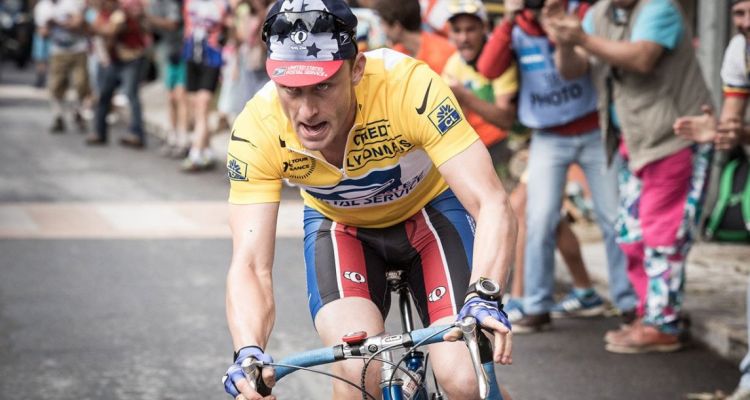 (4 / 5)
(4 / 5)
The sound of the wind. Breathing. A steady heartbeat.
A man on a racing bike waggles his way up a scrubby hillside – his progress is measured, a gradual, steady ascent. Whether or not this is slow motion, it feels like it. All of a sudden, the man is propelled forward in a burst of speed, leaving ghosts of himself as he whips around a curve. It’s all downhill from here: the film’s portrayal of cycling will never be this pure and heartfelt again.
After all, the man, as portrayed by Ben Foster, is Lance Armstrong, seven-time winner of the Tour De France and a now notorious cheat.
The Program, the latest film by Stephen Frears, is so named for the complex regimen of patches, pills, injections, blood in and blood out that allowed Armstrong and his team, US Postal, to dominate the sport. It’s a state of affairs to which John Hodges’ script – based on the exposé by journalist David Walsh – is not, at least initially, entirely unsympathetic. As the 1998 Festina scandal proved, everyone else was doing it.
Armstrong’s real disgrace lay in the destruction of the self-made myth: phenomenal athlete, cancer survivor, charity benefactor, and staunch advocate for transparency, his was a story that, on closer inspection, seemed too good to be true. The only one not applauding is Walsh (a rightfully indignant Chris O’Dowd), a sports journalist for The Sunday Times, who, alone in the crowd, stops to ask the question, “Is this real?” This is, the film suggests, why Armstrong was able to get away with it for so long.
Everyone, from the ineffectual press largely dependent on his good favour – and made Walsh a pariah in order to keep it – to the almost apologetic Union Cycliste Internationale, who’d benefited so much from his high profile.They all needed the fairytale to be true Armstrong’s coach, the taciturn, distinctly Gallic Bruyneel (Inglourious Basterd’s Denis Ménochet) bars the door to a harassed-looking official while Armstrong transfuses blood.
The film that The Program most resembles is last year’s Foxcatcher, though for chilly, brutal distance it substitutes streamlined momentum, as befits the sport it documents, and the pale warmth of Danny Cohen’s yellow-infused cinematography. Yellow is a recurring colour throughout the film, from the yellow jersey in which Armstrong is so often attired to the harsh halogen light that looms over him as he convalesces in hospital, stubble-headed and spindly-limbed, during his grueling cancer treatment.
Even before this, though, we’ve seen him confidently requesting enhancement drug EPO in the pharmacy, as his team mates dawdle unconvincingly over diapers and aspirin, and seeking out Michel Ferrari (Pasoloni lookalike Guillaume Canet), the mad scientist “Godfather of Doping”. Ferrari claims he will make Armstrong fly, and fly, of course, Armstrong does.
The Program devoting most of its 100-minute run-time to his rise to the apex of the sport before his abrupt Icarus-like descent.
Running parallel to Armstrong’s story is that of team member Floyd Landis (Jesse Plemons), a rube who struggles with the immorality of doping in light of his devout Mennonite faith. Armstrong, meanwhile, practises his lies in the mirror and, when questioned by Walsh during a press conference, self-righteously accuses him of being at best a cynical self-publicist and, at worst, pro-cancer. All this while threatening to use his money and connections to “destroy” any cyclist who threatens to break the code of silence.
Armstrong’s true monstrousness is revealed in private council with his agent Bill Stapleton (a typically slick Lee Pace), ranting misogynistically about “bitches” and “whores” – despite a twenty-second meet cute and smash cut to wedding his wife barely makes an appearance, and demanding that Stapleton “sue everyone”.
Foster’s resemblance to Armstrong is uncanny – that fixed gaze, smug grin, and defiantly jutting chin; the rhythms of his Tex-inflected speech. While Steve Carrell in Foxcatcher was buried under layers of prosthetics, Foster here is almost shark-like – even in hospital he seems to believe that if he stops moving he’ll die.
There’s mention in the film of Jake Gyllenhaal being due to play Armstrong in an earlier, presumably more laudatory take on his career, but Foster’s interpretation already feels definitive.
In recreating Armstrong’s tearful confession on Oprah, however, The Program only gives us the canned highlights, denying us the full impact of Armstrong’s public exposure and disgrace. Ultimately the film is unable to reconcile the image of a profoundly decent man who breaks his schedule to sit on the bed of a dying child and determined, dedicated athlete with the unlikable, generally unrepentant bully who threatens other cyclists and laughs at those who get caught.
While suitably lean and propulsive, the film never shows any special insight into Armstrong’s behavior that the slew of documentaries – The Armstrong Lie, Stop At Nothing – hasn’t; in this regard it feels more like a dramatization. As, perhaps, with the man himself – and, accordingly, Foster’s performance – The Program is too lean and guarded to be truly an epiphany.
Frears, meanwhile, is a reliable journeyman director, mainly known for the very British likes of The Queen and Philomena, and succeeds in immersing us in the thick of the peloton (these scenes contains a dynamicism with which TV footage cannot compete).
You’ll want to get with The Program, if only for Foster’s focused performance, which should make for an honest competitor come award’s season.
